Genetically modified beans safe for consumption, FG assures Nigerians
The National Biosafety Management Agency (NBMA) has assured Nigerians that the recently-approved genetically-modified beans is safe for human consumption and the environment. Dr. Rufus Ebegbe, Director General of NBMA, gave the assurance at a workshop jointly organised by Programme for Biosafety Systems, in Port Harcourt, Rivers State. He further said the genetically-modified beans is also […]

National Biosafety Management Agency (NBMA)
The National Biosafety Management Agency (NBMA) has assured Nigerians that the recently-approved genetically-modified beans is safe for human consumption and the environment.
Dr. Rufus Ebegbe, Director General of NBMA, gave the assurance at a workshop jointly organised by Programme for Biosafety Systems, in Port Harcourt, Rivers State.
He further said the genetically-modified beans is also safe for cultivation, contrary to statements by some environmental activists that the beans hazardous to both human health and the environment.
According to him, the beans scaled through several rigorous risks analysis and safety tests before approval for public consumption by the Federal Government.
“So, we urge members of the public to discountenance the rumour.
“This genetically-modified beans or cowpea, released by the Federal Government, is both safe for human consumption and the environment.
“We are saying this with all authority and confidence because we have done what needs to be done as well as carried out risk assessment,” he said.
Ebegbe said the beans is genetically modified with a non-harmful substance sourced from the soil that resists insect attacks and infestation of the staple food.
“There has never been any conventional means to addressing this challenge of infestation which destroys about 70 per cent to 90 per cent of beans leaves over the years.
“This engineering process that has been developed ensures that insect’s attack on beans over the years has now been conquered.
“This breakthrough was achieved by scientists, who discovered a particular gene and material in the body of beans, known as Bacillus Thuringiensis,” he added. (NAN)
